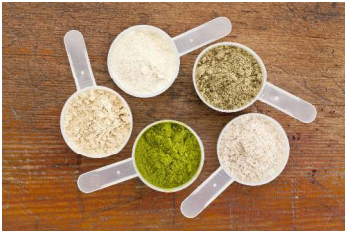 Food Bites with Dr. Hyman – What Kind of Protein Powder Do You Recommend?
Food Bites with Dr. Hyman – What Kind of Protein Powder Do You Recommend?
Mark Hyman, MD
In general, most protein powders readily available to consumers are filled with unnecessary sugars and even artificial sweeteners. Essentially, most are packaged foods and contain a lot of junk – including ingredients that you wouldn’t find in your grandmother’s pantry, can’t pronounce and wouldn’t grow in your own garden.
powders made from whole food sources of protein, such as raw and soaked nuts or seeds (such as hemp, chia, flax, pumpkin or sunflower). These provide the protein, the bulk/texture and satisfy without unnecessary additives.
If you must use a protein powder, then I suggest you consume in moderation and look for the following qualities in your protein powder:
Opt for plant-based protein powders made with hypoallergenic ingredients such as hemp, rice or pea (or even a combo). Specifically, avoid whey protein (a common ingredient in many health store protein powders) unless you are certain that you tolerate dairy. Most whey protein is denatured and sweetened and thus, biologically ineffective. If a product has whey in it, be sure to look for “whey protein concentrate” and avoid whey in its isolate form.
Low toxicity. Ensure your protein powder is third party certified stating the product is low in heavy metals and toxic residue. You can verify your protein powder is high quality by looking for a GMP label certifying that the product was manufactured in a facility adhering to proper industry production standards. The protein powders that I provide my community all have paper trails declaring their purity and that high quality standards were used in the manufacturing process.
Pure and Simple. Protein powder doesn’t have to come all dazzled up with extra reinforcements such as probiotics, green or red plant powders, vitamins, fats or super nutrients. Often, product manufacturers make the consumer feel like they are getting greater value by listing a whole bunch of additives. The truth is that the minute amount and the quality of these added ingredients render them therapeutically ineffectual. So keep it simple and pure – just buy the simplest protein and save the other stuff for your REAL food.
There should be only one ingredient in your protein powder – the source of protein. There should be no additional sweeteners or flavorings. This is easier said than done. My team and I spend a lot of time seeking out the best products to recommend and provide our community. Yet even we are challenged with finding completely unsweetened options. If all you can find is sweetened powders, then look for one that uses REAL sugar as the sweetener. When reading the label, look for these ingredients: real vanilla (or chocolate), and real cane sugar. Avoid products that list “natural flavoring,” high fructose corn syrup and artificial sweeteners such as aspartame or sucralose. Additionally, avoid any ingredient that ends in “ol” such as – sorbitol, maltitol, erythritol or xylitol. Bottom line – a little added sugar is fine but again – keep it real!




